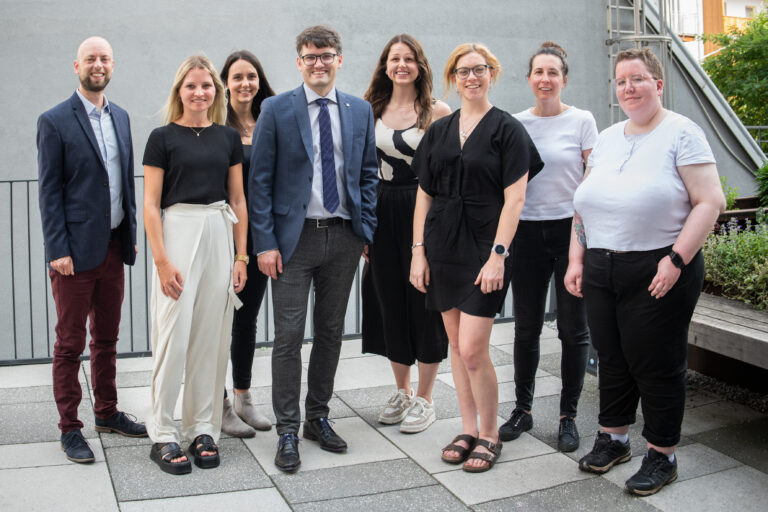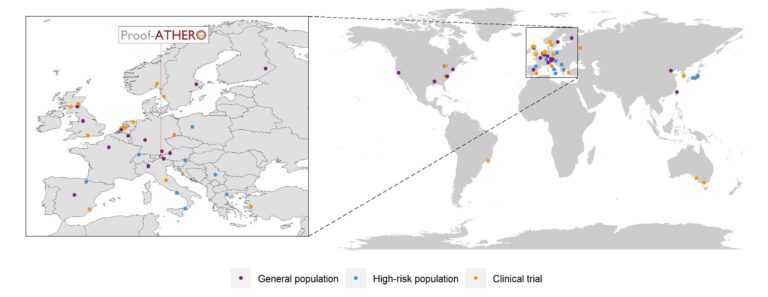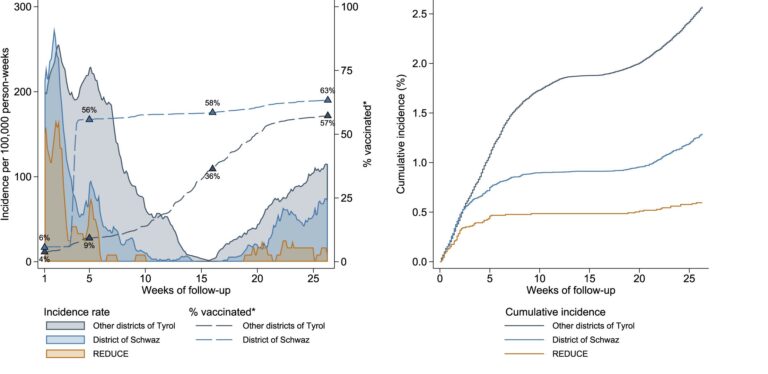
Anichstraße 35
6020 Innsbruck
Email: epi@i-med.ac.at
Website: https://clinicalepi.i-med.ac.at/
Research year
Research Branch (ÖSTAT Classification)
303007 – Epidemiology 303026 – Public Health 305907 – Medical statistics 303025 – Preventive medicine 303010 – Health economics 305902 – Gender medicine
Keywords
cardio-metabolic disease, data science, Epidemiology, infectious diseases, interdisciplinary research, public health, and statistics
Research Focus
The Institute of Health Economics applies cutting-edge methods in data science to clinical research, spanning from study design and data management to analytical tools. Using large-scale data, we aim to scrutinise pathophysiological pathways of different diseases, identify potential targets for therapeutic intervention and improve current strategies for primary and secondary prevention. Our research is strongly interdisciplinary and conducted in close collaborations with our clinical colleagues.
General Facts
The Institute of Health Economics has four distinct research priorities. First, we conduct research into risk markers and prediction models of cardio-metabolic diseases by analysing data from long-term follow-up cohorts and international consortia led by our group. Second, we investigate infectious diseases with a focus on COVID-19 in terms of disease burden, determinants and protection through vaccination programmes. Third, we develop and implement innovative methods in data cleaning and data management with a specific focus on methods involved in individual-participant-data meta-analyses. Fourth, we conduct collaborative projects with different university clinics at the MUI to form interdisciplinary project teams with expertise in clinical medicine, epidemiology and public health. The current members of our team are shown in Figure 1.
Research
Epidemiology and public health of cardiometabolic disease
Peter Willeit, Lena Tschiderer, Lisa Seekircher, Holly Pavey, Gerhard Klingenschmid, Lisa Waltle
Cardio-metabolic diseases are the largest single contributor to global mortality in women and men. Our group aims to better understand and characterise cardio-metabolic diseases including myocardial infarction, stroke and diabetes mellitus, among others.
An important pillar of this research is the Prospective Studies of Atherosclerosis Consortium (Proof-ATHERO), a collaboration coordinated by our institute, which involves studies focussing on atherosclerosis and cardiovascular disease. Proof-ATHERO holds individual-level data of over 70 studies with more than 100,000 participants and serves as an essential data resource for large-scale analyses (Figure 2, Gerontology 2020).
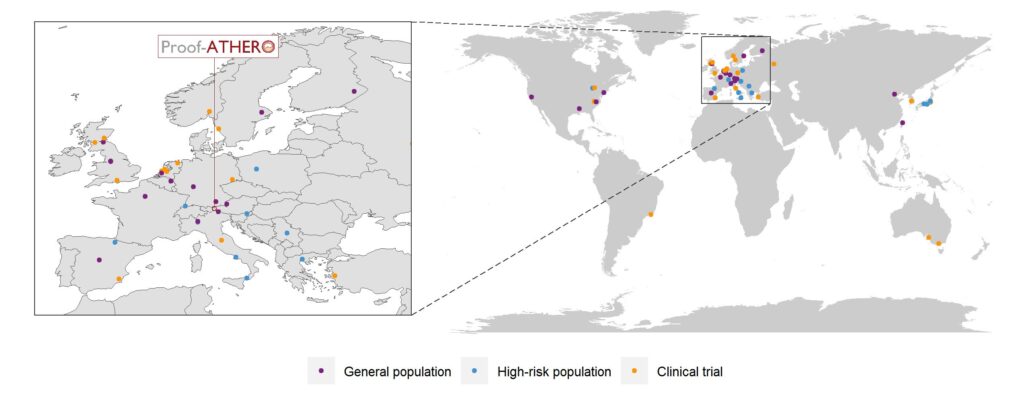
Based on Proof-ATHERO data, we have shown that progression of intima-media thickness, measured by using carotid ultrasound, can be used as a so-called surrogate marker for cardiovascular events in clinical trials (Circulation 2020). We have also characterised the relationship between two frequently used atherosclerosis markers, as we have shown that carotid intima-media thickness is related to a higher risk for first-ever carotid plaque (JAHA 2023). Further projects within this consortium compare the predictive value of intima-media thickness measurements at different sites of the carotid artery and will quantify improvements in cardiovascular risk prediction when assessing carotid intima-media thickness repeatedly over time.
Another important part of our research is the characterisation of sex differences in atherosclerosis and cardiovascular disease. Within the Proof-ATHERO collaboration, we analyse a range of female-specific risk factors for cardiovascular disease, including factors related to pregnancy and menopause to try to understand the relation of these factors to atherosclerosis and its sequelae. In a literature-based meta-analysis, we have also shown that mothers who breastfed have a reduced risk of future cardiovascular disease (JAHA 2022).
In addition, we are working with other large-scale studies in the framework of cardio-metabolic disease. These include the Bruneck study, which stands out by its long-term follow-up as it was initiated in 1990 and is still ongoing. Using data of the Bruneck study, we have shown that dickkopf-1, a glycoprotein, which plays an important role in bone homeostasis, is associated with incident cardiovascular events (JAHA 2020). Moreover, we are working with UK Biobank data, which is an exceptionally large study with more than 500,000 individuals from the general population of the UK. These data will be used for several projects in which we aim to scrutinise pathways in cardio-metabolic diseases.
Finally, as part of the European Society of Cardiology Cardiovascular Risk working group, we have contributed to the development of the updated risk prediction algorithms to be used for primary prevention of cardiovascular disease in the general European population (Eur Heart J 2021) and patients with diabetes (Eur Heart J 2023).
Epidemiology and public health of infectious diseases
Peter Willeit, Lisa Seekircher, Lena Tschiderer, Hanna Innerhofer
The COVID-19 pandemic has shown the potential impact of infectious diseases on public health and the need for well-designed epidemiological studies and disease surveillance systems for pandemic preparedness. During the COVID-19 pandemic, our group has been involved and led four distinct research projects.
First, we have worked on design and analysis of the Austrian School-SARS-CoV-2 prospective cohort study (“Gurgelstudie”), in which we quantified prevalence of SARS-CoV-2 infections across 250 representative schools throughout the school year 2020/2021 and provided novel insight into the correlations of frequency of infections in schools vs the general community (Lancet Reg Health Eur 2021) and the test performance of the Austrian antigen-based self-testing programme (Euro Surveill 2021).
Second, together with our colleagues at the Central Institute for Blood Transfusion and Immunology, we have been assessing seroprevalence of antibody levels against SARS-CoV-2 among blood donors. This project involved over 100,000 measurements between June 2020 and December 2022, and provided both novel scientific insights and important information to regional and national decision makers (Wien Klin Wochenschr 2021, Viruses 2022, Viruses 2022).
Third, our institute led the REDUCE study, which accompanied the ultra-rapid rollout vaccination with BNT126b2 in the district of Schwaz in March 2021 and was set up with enormous efforts within a short time frame of 10 days. The REDUCE study involved approximately 12,000 individuals and showed that the vaccination initiative was highly effective in terms of reducing SARS-CoV-2 incidence (Figure 3, iScience 2022).
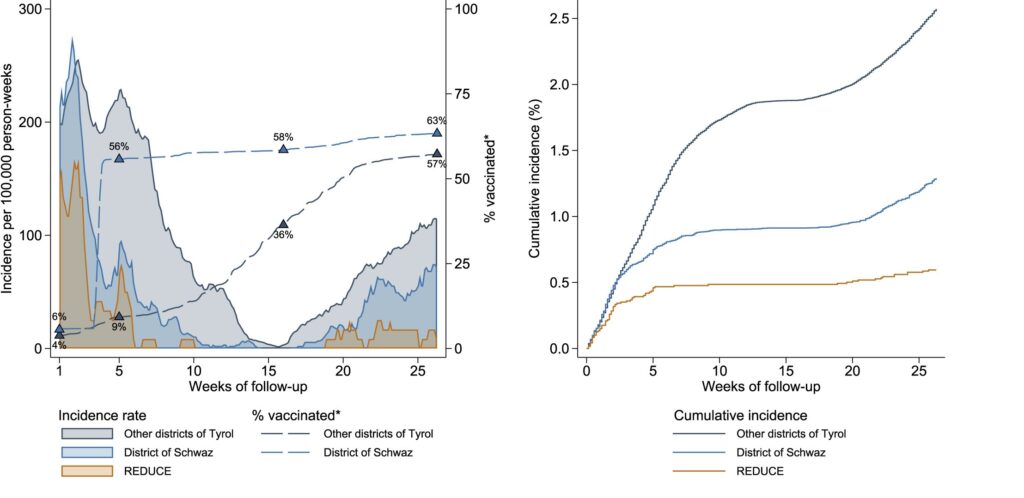
In another study coupled to the Schwaz vaccination programme, the Shieldvacc-2 study, a phase-4 open-label trial, we measured anti-SARS-CoV-2 binding and neutralising antibodies and T-cell responses to two-dose BNT126b2 vaccination and revealed a log-linear relationship between higher antibody levels and protection of SARS-CoV-2 breakthrough infection over a six-month follow-up (Lancet Microbe 2023).
Finally, during the COVID-19 pandemic, we have contributed to expert statements, for instance highlighting the benefits, costs and feasibility of a low incidence COVID-19 strategy (Lancet Reg Health Eur 2022) and setting out strategies to enhance European collaboration in addressing the COVID-19 pandemic (Lancet 2021).
Data management and statistical analyses
Peter Willeit, Lena Tschiderer, Lisa Seekircher, Holly Pavey, Lisa Waltle
As our group works with various large-scale datasets containing complex data structures, sophisticated data management methods are crucial. We have developed our own in-house data management system that can handle different data structures and support scientists in data cleaning and data harmonisation approaches. Our data management system is a sophisticated tool to comprehensively structure different datasets in the same way while it is flexible for various types of data. This is very helpful in cleaning data from individual studies and is specifically important when combining data from multiple studies.
In addition to data cleaning, our group has expertise in applying cutting-edge statistical methods. One focus is on individual-participant data meta-analysis, for instance in the context of the Proof-ATHERO consortium. Meta-analysing these large-scale data can provide more reliable and more precise effect sizes than analysing data from a single study, as it is associated with greater statistical power. Combining data from various studies allows the identification of sources of heterogeneity. Furthermore, we are using methods for the analysis of longitudinal studies, such as mixed-effects models, clinical prediction models to help predict cardio-metabolic or infectious diseases, time-to-event analysis to quantify the risk to develop certain diseases and statistical methods to evaluate causality.
Pictures
Selected Publications
Seekircher, Lisa; Bánki, Zoltán; Kimpel, Janine; Rössler, Annika; Schäfer, Helena; Falkensammer, Barbara; Bante, David; Forer, Lukas; Schönherr, Sebastian; Shieldvacc-2 Study Group; Harthaller Teresa; Sacher, Magdalena; Ower, Cornelia; Tschiderer, Lena; Ulmer, Hanno; Krammer, Florian; von Laer, Dorothee; Borena, Wegene; Willeit Peter: Immune response after two doses of the BNT162b2 COVID-19 vaccine and risk of SARS-CoV-2 breakthrough infection in Tyrol, Austria: an open-label, observational phase 4 trial.
Lancet Microbe. 2023 21; S2666.
PubMed: 37354911 doi: 10.1016/S2666-5247(23)00107-6
Willeit, Peter; Krause, Robert; Lamprecht, Bernd; Berghold, Andrea; Hanson, Buck; Stelzl, Evelyn; Stoiber, Heribert; Zuber, Johannes; Heinen, Robert; Köhler, Alwin; Bernhard, David; Borena, Wegene; Doppler, Christian; von Laer, Dorothee; Schmidt, Hannes; Pröll, Johannes; Steinmetz, Ivo; Wagner, Michael: Prevalence of RT-qPCR-detected SARS-CoV-2 infection at schools: First results from the Austrian School-SARS-CoV-2 prospective cohort study.
Lancet Reg Health Eur. 2021; 5:100086
PubMed: 34396360 doi: 10.1016/j.lanepe.2021.100086
Tschiderer, Lena; Seekircher, Lisa; Richter, Lukas; von Laer, Dorothee; Lass-Floerl, Cornelia; Forer, Lukas; Schoenherr, Sebastian; Krammer, Florian; Embacher-Aichhorn, Sabine; Tilg, Herbert; Weiss, Gunter; Allerberger, Franz; Willeit, Peter: Ultra-rapid rollout vaccination with BNT162b2 to reduce SARS-CoV-2 infections in the general population.
ISCIENCE. 2022; 25(11); 105380.
PubMed: 36373097 doi: 10.1016/j.isci.2022.105380
Tschiderer, Lena; Seekircher, Lisa; Izzo, Raffaele; Mancusi, Costantino; Manzi, Maria V.; Baldassarre, Damiano; Amato, Mauro; Tremoli, Elena; Veglia, Fabrizio; Tuomainen, Tomi‐Pekka; Kauhanen, Jussi; Voutilainen, Ari; Iglseder, Bernhard; Lind, Lars; Rundek, Tatjana; Desvarieux, Moise; Kato, Akihiko; de Groot, Eric; Aşçi, Gülay; Ok, Ercan; Agewall, Stefan; Beulens, Joline W. J.; Byrne, Christopher D.; Calder, Philip C.; Gerstein, Hertzel C.; Gresele, Paolo; Klingenschmid, Gerhard; Nagai, Michiaki; Olsen, Michael H.; Parraga, Grace; Safarova, Maya S.; Sattar, Naveed; Skilton, Michael; Stehouwer, Coen D. A.; Uthoff, Heiko; van Agtmael, Michiel A.; van der Heijden, Amber A.; Zozulińska‐Ziółkiewicz, Dorota A.; Park, Hyun‐Woong; Lee, Moo‐Sik; Bae, Jang‐Ho; Beloqui, Oscar; Landecho, Manuel F.; Plichart, Matthieu; Ducimetiere, Pierre; Empana, Jean Philippe; Bokemark, Lena; Bergström, Göran; Schmidt, Caroline; Castelnuovo, Samuela; Calabresi, Laura; Norata, Giuseppe D.; Grigore, Liliana; Catapano, Alberico; Zhao, Dong; Wang, Miao; Liu, Jing; Ikram, M. Arfan; Kavousi, Maryam; Bots, Michiel L.; Sweeting, Michael J.; Lorenz, Matthias W.; Willeit, Peter; Proof‐ATHERO Study Group: Association of Intima‐Media Thickness Measured at the Common Carotid Artery With Incident Carotid Plaque: Individual Participant Data Meta‐Analysis of 20 Prospective Studies.
Journal of the American Heart Association. 2023;12:e027657.
PubMed: 37301757 doi: 10.1161/JAHA.122.027657
Willeit, Peter; Tschiderer, Lena; Allara, Elias; Reuber, Kathrin; Seekircher, Lisa; Gao, Lu; Liao, Ximing; Lonn, Eva; Gerstein, Hertzel C.; Yusuf, Salim; Brouwers, Frank P.; Asselbergs, Folkert W.; van Gilst, Wiek; Anderssen, Sigmund A.; Grobbee, Diederick E.; Kastelein, John J. P.; Visseren, Frank L. J.; Ntaios, George; Hatzitolios, Apostolos I.; Savopoulos, Christos; Nieuwkerk, Pythia T.; Stroes, Erik; Walters, Matthew; Higgins, Peter; Dawson, Jesse; Gresele, Paolo; Guglielmini, Giuseppe; Migliacci, Rino; Ezhov, Marat; Safarova, Maya; Balakhonova, Tatyana; Sato, Eiichi; Amaha, Mayuko; Nakamura, Tsukasa; Kapellas, Kostas; Jamieson, Lisa M.; Skilton, Michael; Blumenthal, James A.; Hinderliter, Alan; Sherwood, Andrew; Smith, Patrick J.; van Agtmael, Michiel A.; Reiss, Peter; van Vonderen, Marit G. A.; Kiechl, Stefan; Klingenschmid, Gerhard; Sitzer, Matthias; Stehouwer, Coen D. A.; Uthoff, Heiko; Zou, Zhi-Yong; Cunha, Ana R.; Neves, Mario F.; Witham, Miles D.; Park, Hyun-Woong; Lee, Moo-Sik; Bae, Jang-Ho; Bernal, Enrique; Wachtell, Kristian; Kjeldsen, Sverre E.; Olsen, Michael H.; Preiss, David; Sattar, Naveed; Beishuizen, Edith; Huisman, Menno V.; Espeland, Mark A.; Schmidt, Caroline; Agewall, Stefan; Ok, Ercan; Asci, Gulay; de Groot, Eric; Grooteman, Muriel P. C.; Blankestijn, Peter J.; Bots, Michiel L.; Sweeting, Michael J.; Thompson, Simon G.; Lorenz, Matthias W.; PROG-IMT Proof-ATHERO Study Grp: Carotid Intima-Media Thickness Progression as Surrogate Marker for Cardiovascular Risk Meta-Analysis of 119 Clinical Trials Involving 100 667 Patients.
CIRCULATION. 2020; 142(7); 621-642.
PubMed: 32546049 doi: 10.1161/CIRCULATIONAHA.120.046361
Selection of Funding
FWF Hertha-Firnberg project: Sex differences in atherosclerosis and its clinical sequelae (Project started in May 2021)
Land Tirol: REDUCE study
Collaborations
John Danesh, University of Cambridge, Cambridge, UK
Angela Wood, University of Cambridge, Cambridge, UK
Sylvia Knapp, Medical University of Vienna, Vienna, Austria
Michael Wagner, University of Vienna, Vienna, Austria
Thomas Czypionka, IHS Institute for Advanced Studies, Vienna, Austria
Harald Schennach, Tirol Kliniken GmbH, Innsbruck, Austria
David A Larsen, Syracuse University, Syracuse, NY, United States
Sanne Peters, UMC Utrecht, Utrecht, the Netherlands
147 Proof-ATHERO collaborators at 74 research institutions in 25 countries
